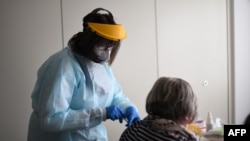As Germany on Friday surpassed 50,000 deaths from COVID-19 since the start of the pandemic, public health officials there expressed cautious optimism about a slowing infection rate.
The Robert Koch Institute disease control center reported 17,862 new coronavirus cases since Thursday, bringing the total number of Germany’s infections to more than 2.1 million.
At a news conference in Berlin, RKI president Lothar Wieler said he saw a "slightly positive trend" in the numbers after several days in the last month where daily infections rose above 20,000.
He credited the drop to a partial lockdown originally introduced in November and since tightened.
Weiler said he urged the government to maintain the current restrictions until Germany sees a "massive" drop in cases and deaths.
Wieler told reporters the 50,642 total COVID-19 fatalities were "a distressing, incomprehensible number to me."
Speaking at the same press conference, the president of Germany's association for intensive care medicine, Gernot Marx, said he saw no evidence of a spike in hospitalizations from the Christmas and New Year's holidays, which he credited to nationwide restrictions on gatherings.
But Marx cautioned that while there are clearly falling numbers of patients in intensive care, the health care system is still feeling a strain. He noted on average patients on respirators are hospitalized for 25 days but others remain in treatment for 60 days or even more than 90 days.
Health Minister Jens Spahn called the falling infection and hospitalization numbers "encouraging" but warned they were "still too high." He said COVID-19 restrictions will stay in place for now. He noted that several countries that had eased their lockdowns at the first sign of improvement "quickly saw a new flare-up."






